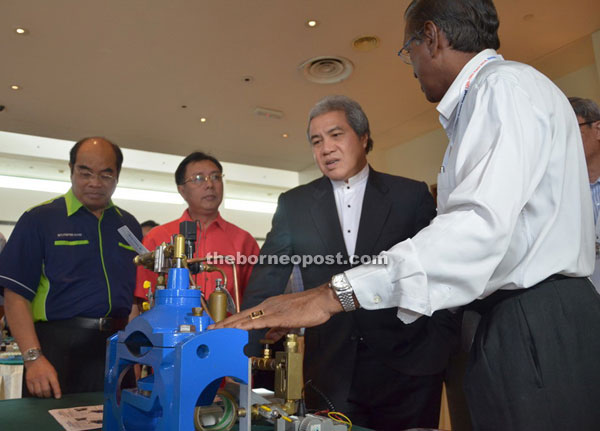
Awang Tengah (second right) being briefed by one of the exhibitors as Entri (left) and Dr Rundi look on.
BINTULU: Everybody needs water. As such, those responsible must endeavour to provide adequate, reliable and quality water to all consumers at all times.
Thus, the water rationing in several states in Peninsular Malaysia should serve as a reminder to the water authorities in Sarawak on how important it is to manage water supply prudently all the way from the raw water source to the treated water at the consumer’s tap, said Second Minister of Resource Planning and Environment Datuk Amar Awang Tengah Ali Hasan.
Speaking at the opening ceremony of the third edition of Sarawak Water Supply Retreat 2014 themed ‘Optimising Demand Management for Water Supplies in Sarawak’ at ParkCity Everly Hotel here yesterday, the Minster of Public Utilities and Industrial Development said it is a fact that water authorities in many parts of the world, including Malaysia, were faced with increasing challenges in terms of quality and quantity of water resources.
“Water scarcity is affecting every continent, brought about by climate change due to global warming, wastage of water and pollution of water resources amongst many other causes,” he said.
Climate change, rapid population growth and urbanisation, industrialisation, water quality, diminishing freshwater resources, non-revenue water and aging infrastructures, he said, are all taking their toll on the water supply systems.
“Whilst our population is rapidly increasing, water resources have remained constant, with the water quality deteriorating due to pollution.
“Therefore, there is an urgent need for improved water conservation, methods for managing water demand and technologies to reduce water wastage,” he said.
He pointed out that water demand management has been defined as a management approach that aims to conserve both the quality and quantity of water by controlling demand.
“It aims to increase water efficiency through both wise use and reduction, which in turn will reduce or postpone the need to build more infrastructures such as treatment plants, dams, reservoirs and distribution systems,” he added.
A more holistic water demand management, he said, should cover the management of water demand in all sectors of the state including municipalities, industry, tourism, agriculture, forestry and other activities of importance.
It has been estimated that about 70 per cent of the earth surface is covered by water and less than one per cent of the water on earth can be used as drinking water, therefore it can no longer be taken for granted even in our country which has a tropical climate with very high annual rainfall, he pointed out.
The United Nations, he said, has warned that most of the countries in the world are not yet prepared for the adverse impacts of climate change that are already taking place on a global scale.
The UN report has confirmed that the effects of climate change are already widespread and consequential, affecting water supplies, human health, agriculture and ecosystems among others, he added.
“The Asean Specialised Meteorological Centre in Singapore has predicted that another dry spell longer than the current one as experienced in Peninsular Malaysia is expected from June until October this
year, lasting about five months.
“In this situation, we cannot afford to rest on our laurels but be ever vigilant and ready so that we would not be caught off-guard, thus we must be ready to put in place all necessary contingency measures,” he advised.
He also hoped the four-day water supply retreat would produce some good ideas to meet the needs of domestic consumers and industrialisation taking place in Sarawak Corridor of Renewable Energy. About 90 participants are taking part in the retreat.
Among those present were Assistant Minister of Public Utilities (Water Supply) Datuk Sylvester Entri, Assistant Minister of Public Utilities (Electricity and Telecommunications) Datuk Dr Stephen Rundi and permanent secretary of Ministry of Public Utilities Ubaidillah Abdul Latip.

